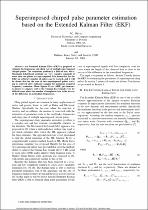 ResearchSpace
ResearchSpace
Superimposed chirped pulse parameter estimation based on the extended Kalman filter (EKF)
JavaScript is disabled for your browser. Some features of this site may not work without it.
- ResearchSpace
- →
- Research Publications/Outputs
- →
- Conference Publications
- →
- View Item
| dc.contributor.author |
Olivier, JC

|
|
| dc.date.accessioned | 2010-01-12T11:37:23Z | |
| dc.date.available | 2010-01-12T11:37:23Z | |
| dc.date.issued | 2009-05 | |
| dc.identifier.citation | Olivier, JC. 2009. Superimposed chirped pulse parameter estimation based on the extended Kalman filter (EKF). OCEANS '09 IEEE Bremen: Balancing Technology with Future Needs, Bremen, Germany, 11-14 May 2009, pp 1-3 | en |
| dc.identifier.isbn | 978-1-4244-3861-7 | |
| dc.identifier.uri | http://hdl.handle.net/10204/3881 | |
| dc.description | Copyright: 2009 Institute of Electrical and Electronics Engineering (IEEE). Personal use of this material is permitted. However, permission to reprint/republish this material for advertising or promotional purposes or for creating new collective works for resale or redistribution to servers or lists, or to reuse any copyrighted component of this work in other works must be obtained from the IEEE. | en |
| dc.description.abstract | An extended Kalman filter (EKF) is proposed to estimate the frequencies and chirp rate of multiple superimposed chirped pulses. The estimation problem is a difficult one, where maximum likelyhood methods are very complex especially if more than two pulses are superimposed. It is shown that for the EKF an arbitrary number of pulses can be tracked, and it will be shown that for the case of two superimposed pulses tracking is achieved after sufficient samples for minimum required frequency resolution. Mean square error (MSE) performance is shown to compare well to the Cramer-Rao bounds even for difficult cases where the number of samples is close to the inverse of the difference in normalized frequencies. | en |
| dc.language.iso | en | en |
| dc.publisher | Institute of Electrical and Electronic Engineers (IEEE) | en |
| dc.subject | Extended Kalman filter | en |
| dc.subject | Tracking filters | en |
| dc.subject | Superimposed chirped pulses | en |
| dc.subject | OCEANS '09 IEEE Bremen | en |
| dc.title | Superimposed chirped pulse parameter estimation based on the extended Kalman filter (EKF) | en |
| dc.type | Conference Presentation | en |
| dc.identifier.apacitation | Olivier, J. (2009). Superimposed chirped pulse parameter estimation based on the extended Kalman filter (EKF). Institute of Electrical and Electronic Engineers (IEEE). http://hdl.handle.net/10204/3881 | en_ZA |
| dc.identifier.chicagocitation | Olivier, JC. "Superimposed chirped pulse parameter estimation based on the extended Kalman filter (EKF)." (2009): http://hdl.handle.net/10204/3881 | en_ZA |
| dc.identifier.vancouvercitation | Olivier J, Superimposed chirped pulse parameter estimation based on the extended Kalman filter (EKF); Institute of Electrical and Electronic Engineers (IEEE); 2009. http://hdl.handle.net/10204/3881 . | en_ZA |
| dc.identifier.ris | TY - Conference Presentation AU - Olivier, JC AB - An extended Kalman filter (EKF) is proposed to estimate the frequencies and chirp rate of multiple superimposed chirped pulses. The estimation problem is a difficult one, where maximum likelyhood methods are very complex especially if more than two pulses are superimposed. It is shown that for the EKF an arbitrary number of pulses can be tracked, and it will be shown that for the case of two superimposed pulses tracking is achieved after sufficient samples for minimum required frequency resolution. Mean square error (MSE) performance is shown to compare well to the Cramer-Rao bounds even for difficult cases where the number of samples is close to the inverse of the difference in normalized frequencies. DA - 2009-05 DB - ResearchSpace DP - CSIR KW - Extended Kalman filter KW - Tracking filters KW - Superimposed chirped pulses KW - OCEANS '09 IEEE Bremen LK - https://researchspace.csir.co.za PY - 2009 SM - 978-1-4244-3861-7 T1 - Superimposed chirped pulse parameter estimation based on the extended Kalman filter (EKF) TI - Superimposed chirped pulse parameter estimation based on the extended Kalman filter (EKF) UR - http://hdl.handle.net/10204/3881 ER - | en_ZA |





